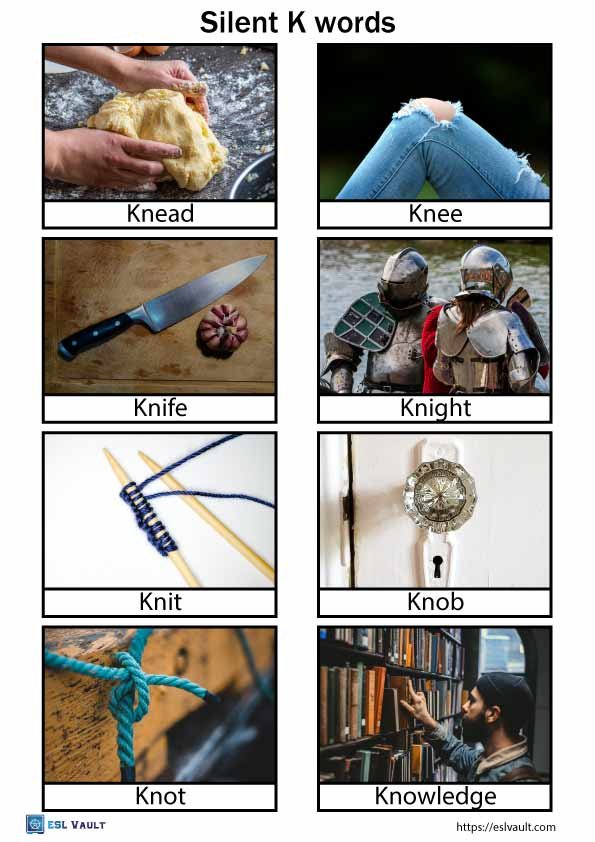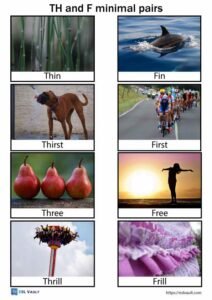Silent K words
In English, there are many words in which the letter K is silent and not pronounced at all. These instances mostly occur when a word starts with the letter K and is followed by the letter N. They can also be found in compound nouns that use these words.
It is fascinating to note that in previous centuries the K in many of these words was not silent at all. For one reason or another this has evolved into the modern English language.
The non-pronunciation of silent letters is not naturally intuitive for children and ESL learners, it needs to be taught. On this page, there are words, flashcards, meanings of uncommon words, and practice sentences in which K is not pronounced to help you do this!
Silent K words list
Here is an alphabetical list of words with silent K. It is the same as the free PDF above. It might come in useful if you just want to copy and paste some of the most common words for your classes.
Knack
Knacker
Knackerman
Knackery
Knackwurst
Knaggy
Knap
Knapsack
Knave
Knavery
Knawel
Knead
Knee
Kneebrush
Kneel
Kneecap
Knee pad
Kneestone
Knell
Knelt
Knew
Knick
Knickers
Knickerbocker
Knickknack
Knickline
Knife
Knifepoint
Knight
Knighthood
Knit
Knitch
Knittable
Knittle
Knob
Knobbly
Knobby
Knobkerrie
Knock
Knockabout
Knockdown
Knockmeter
Knockout
Knobstick
Knockstone
Knockoff
Knoll
Knosp
Knot
Knotgrass
Knotweed
Knout
Know
Knowhow
Knowledge
Known
Knubby
Knuckle
Knuckleball
Knucklehead
Knur
Knurl
Knurling
Silent K words pictures
Below is a free PDF with 8 printable flashcards that you can use to teach words with a silent K to young learners and ESL students.
Uncommon silent K words
You might be unfamiliar with some of the silent K words in the list above. Some curious lesser-known words are worth taking a quick look at. Here are some of them along with their meanings.
Knackery – This is like an abattoir, a place where animals are slaughtered and butchered for meat and by-products. Interestingly, In UK and Australian slang to say that you are knackered means you are exhausted.
Knackwurst – Knackwurst or knockwurst is a short veal and pork sausage from Northern Germany. It is often eaten as a snack and can be served with mustard, sauerkraut, and bread.
Knap – As a noun a knap is the top of a small hill. As a verb, it means to strike something suddenly or break it with a sharp blow. It can also mean to chip away at something like you would do if you were making a spearhead out of stone.
Knawel – This word originates from German and is a kind of plant. This low-growing plant is often regarded as a weed as it spreads quickly. It has green flowers and narrow leaves. It comes from Eurasia but can also now be found across North America.
Knitch – This somewhat outdated word means a small bundle of something. It is generally used to describe a small bundle of a plant such as wheat, hay, reeds, straw, weeds, wood, or something similar.
Knobbly – This adjective describes something that is covered in small lumps and has an uneven bumpy surface.
Knobkerrie – This is a wooden club with a knob at one end. It comes from Africa and is used as a weapon of war, for hunting animals, and even as a walking stick. Besides being a club it is also thrown at prey and enemies.
Knur – A knur is a hard knot growing on a tree which can also be known as a knarl.
Knurling – This is a manufacturing process that is mostly used in metalwork. This process creates lines (knurls) on the surface of an object to either improve its appearance or give it a better grip.
Knosp – This word is used to describe a budlike ornament and the unopened bud of a flower. It can also be any flower bud shape or decoration in architecture.
Knout – The knout is a whip with leather thongs. It was infamously used to punish criminals in Russian history.
Practice sentences
Try using these practice sentences that use both the pronounced and silent K with your students to reinforce this vocabulary.
The knight knelt on his knobbly knees.
Katy knew how to knit.
A kitchen knife in a thick knapsack.
He kneads the king’s dough with his knowhow on the knoll.
The doorknob is broken so please knock.
A kind knaves knuckles.





